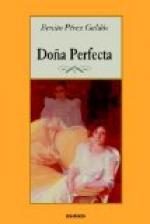As is stated in the above preface, a considerable part of the notes in the first impression were intended as a partial substitute for a vocabulary. Obviously, the insertion of the vocabulary made such notes mainly superfluous; hence in the present edition such notes as seemed to be mere duplication of the vocabulary are omitted. At the same time it was inevitable that in the work of compiling the vocabulary some additional occasions for making notes were found, and new light was obtained on some places where notes already stood. The result is that the notes in the present impression, though shorter than before, contain (apart from vocabulary matter) more information, and it is hoped that they will at least maintain the reputation which this edition of Dona Perfecta has gained.
Besides the references to the grammars of Ramsey and Knapp, references to Coester’s Spanish Grammar (Boston, 1912) are now given.
INTRODUCTION
The two literary genres in which Spaniards have most excelled are the drama and the novel. Indeed, outside of these two forms, it may be said that no Spaniard has won a literary success of the first order. Thus, in the past six centuries there have been many Spanish poets of real worth; and yet in the list of the world’s supreme poets no Spanish name appears. Among the world’s great philosophers Spain has no representative, though she has had thinkers of genuine power. She has had no moralist, or historian, or political writer, or scientist of the highest rank. Even religion, which at first sight would seem to be the predominant interest of Spain, has not there inspired any work of universal and permanent appeal to the race. The other nations of the civilized world have at no time derived from Spain a powerful literary impulse in any of these directions. Palestine and Greece and Rome and Italy and France and Germany and England have all had something lastingly valuable to say upon one or more of these matters; but no one would think of turning to Spanish books for the best that has been thought and said upon any of them.
With the drama and the novel, however, the case is very different. Here Spain has had writers universally placed among the great artists of the world. Calderon and Lope de Vega, with the crowd of lesser dramatists of the end of the sixteenth and beginning of the seventeenth century (the period Spaniards call their siglo de oro), produced a body of dramatic literature, which for extent, variety, poetic force, and original national feeling and conception can be compared only with the Greek and the English drama. Of their own motion these poets learned all the essential secrets of the dramatic art. They acquired the faculty of telling upon the stage any story they chose in such a way that it should seem a picture of life itself to their audience; and, at the same time, they managed to fuse with their tales all their accumulated




